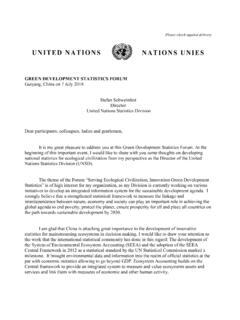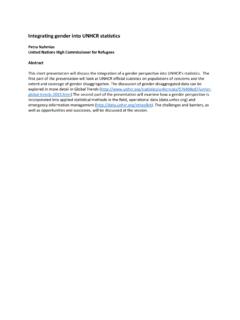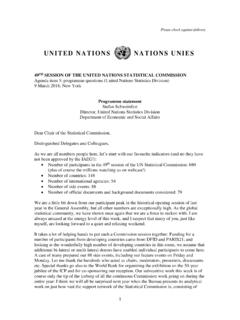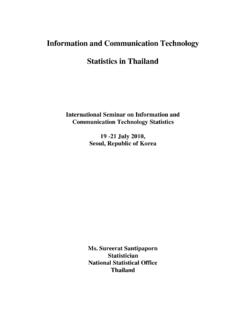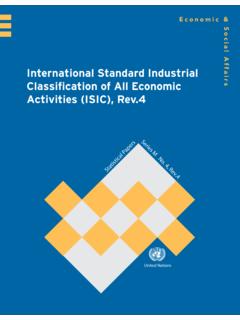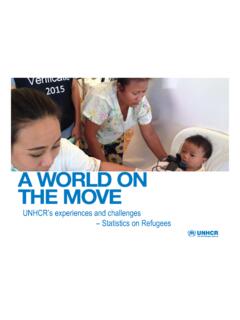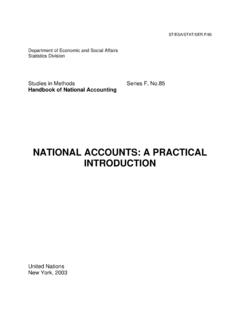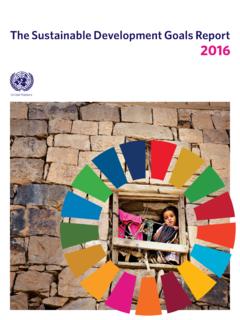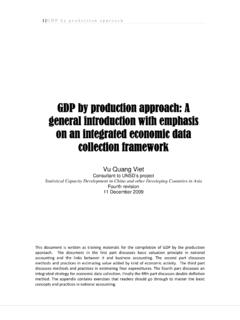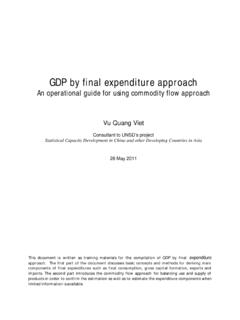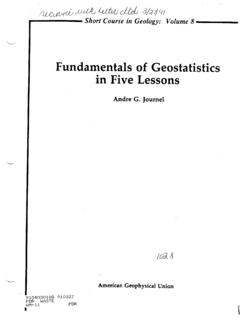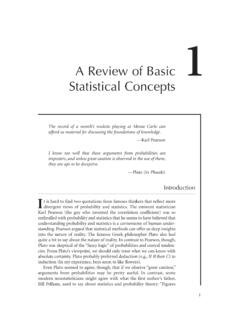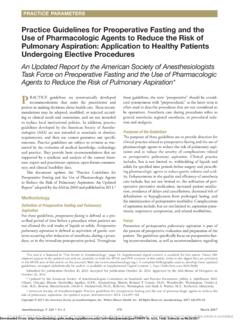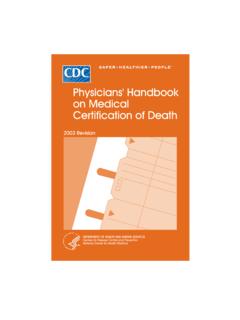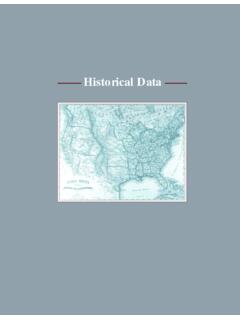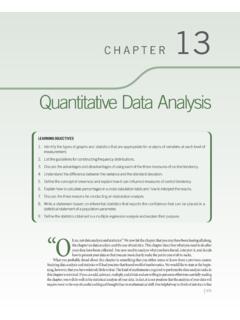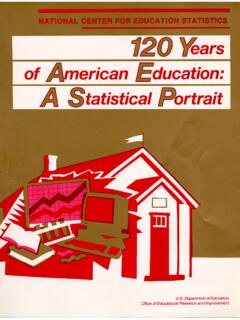Transcription of l 2008 - UNSD
1 Social AffairsEconomic &United NationsasdfInternational Recommendations for Tourism Statistics2008 Printed at the United Nations, New York08-40120 February 2010 2,550 USD 58 ISBN 978-92-1-161521-0 Department of Economic and Social AffairsStatistics DivisionInternational Recommendations for Tourism Statistics2008 New York, 2010ST/ESA/ in Methods Series M No. 83 NationsDepartment of Economic and Social AffairsThe Department of Economic and Social Affairs of the United Nations Secretariat is a vital interface between global policies in the economic, social and environmental spheres and national action. The Department works in three main interlinked areas: (i) it compiles, generates and analyses a wide range of economic, social and environ-mental data and information on which States Members of the United Nations draw to review common problems and to take stock of policy options; (ii) it facilitates the negotiations of Member States in many intergovernmental bodies on joint courses of action to address ongoing or emerging global challenges.
2 And (iii) it advises interested Governments on the ways and means of translating policy frameworks developed in United Nations conferences and summits into programmes at the country level and, through technical assistance, helps build national designations employed and the presentation of material in this publication do not imply theexpression of any opinion whatsoever on the part of the Secretariat of the United Nations concerning thelegal status of any country, territory, city or area or of its authorities, or concerning the delimitation of its frontiers or term country as used in this publication also refers, as appropriate, to territories or designations developed regions and developing regions are intended for statis-tical convenience and do not necessarily express a judgement about the stage reached by a particular country or area in the development of United Nations documents are composed of capital letters combined with Nations PublicationSales No.
3 978-92-1-161521-0 Copyright United Nations, 2010 All rights reserved iiiForewordInternational Recommendations for Tourism Statistics 2008 was prepared in accord-ance with the decision of the United Nations Statistical Commission at its thirty-fifth session held from 2 to 5 March 20041 and revises Recommendations on Tourism Statis-tics, adopted by the Commission in 1993 and published in international recommendations were drafted by the World Tourism Organi-zation (UNWTO) in close cooperation with the United Nations Statistics Division, the International Labour Organization (ILO) and other members of the Inter-Agency Coordination Group on Tourism Statistics, which was created in 2004 at the request of the Commission and comprises UNWTO, United Nations Statistics Division, ILO, the Organization for Economic Cooperation and Development (OECD), Eurostat, the International Monetary Fund (IMF) and the World Trade Organization (WTO).
4 The incorporate findings and conclusions of the UNWTO Committee on Statistics and Tourism Satellite Account, inputs received from national statistical offices, national tourism administrations and international organizations during a worldwide consul-tation on the contents of the recommendations. A draft version of the recommenda-tions was reviewed and endorsed by the United Nations Expert Group on Tourism Statistics, which met in New York from 25 to 28 June 2007. Statistics Canada provided a thorough review of the text prior to its submission to the Commission for preparation of international tourism recommendations is a part of the efforts of UNWTO and the United Nations Statistics Division to strengthen countries in the methodological and operational foundations of tourism statistics in an integrated manner, including enhancement of the coherence of tourism statistics with other offi-cial statistics and further development of tourism satellite present publication, International Recommendations for Tourism Statistics 2008 provides a comprehensive methodological framework for collection and compi-lation of tourism statistics in all countries irrespective of the level of development of their statistical systems.
5 Its primary audience is the staff of national statistical offices and national tourism administrations involved in the compilation of tourism statis-tics. The publication also contains a wealth of information that might be of interest to data users who would like to understand better the nature of tourism data. In addition, general guidance is provided with respect to data sources and data compilation meth-ods, which will be complemented by a forthcoming compilation guide to be released in Official Records of the Economic and Social Council 2004, Supplement No. 4 (E/2004/24), chap. III C, para. 6 (c and d).2 Recommendations on Tourism Statistics, Statistical Papers, Series M, United Nations Publication Sales No. ).ivInternational Recommendations for Tourism Statistics 2008 AcknowledgementsThe International Recommendations for Tourism Statistics 2008 were prepared by the Department of Statistics and Tourism Satellite Account of the World Tourism Organi-zation (UNWTO) and the United Nations Statistics Division, in collaboration with the members of the United Nations Expert Group on Tourism Statistics, as well as participants in the 8th meeting of the UNWTO Committee on Statistics and Tourism Satellite Account, which was specially dedicated to a review of the provisional of the United Nations Expert Group on Tourism Statistics included (in alphabetical order).
6 Wayne Calder (Australia), Agust n Ca ada (Spain), Igor Cherny-shev (ILO), Fernando Cortina (Spain), Johannes de Beer (South Africa), Christophe Demunter (Eurostat), Viviana Depino de Aviles (Argentina), Citlalin Dur n Fuentes (Mexico), Chabala Evaristo (Zambia), Margaret Fitzgibbon (IMF), Alain Gaugris (United Nations Statistics Division), Iv n Guillermo Gonz lez de Alba (Mexico), Fran-cisco Guillen-Martin (Mexico), Christopher Jackson (Canada), Zirk Jansen (South Africa), Katharine Kemp (UNWTO), Alexander Kevesh (Russian Federation), Peter Laimer (Austria), Marion Libreros (UNWTO), Pamela Lowe (Bahamas), Steve Mac-Feely (Ireland), Mohd Uzir Mahidin (Malaysia), Vladimir Markhonko (United Nations Statistics Division), Antonio Massieu (UNWTO), Lydia Mbonde (South Africa), Caro-lyn McDonald Riley (Jamaica), Neil McInnis (Canada), Scott Meis (UNWTO), Shaila Nijhowne (UNWTO), Miguel Oliva (Argentina), Florande Polistico (The Philippines), Isabel P rez Varela (Spain), Mar a Gabriela Rembado Thomas (Spain), Milagros Yanos Say (The Philippines), Ulrich Spoerel (Eurostat), Cynthia Warshaw (United States of America), Tom Ylk nen (Finland) and Chong Yoke Har (Malaysia).
7 Participants in the UNWTO Committee on Statistics and Tourism Satellite Account included (in alphabetical order): Abdulaziz Alrasheed (Saudi Arabia), Michel Barge (France), Dennis Bederoff (Sweden), Alicia Bollo (Spain), Ntobeko Buso (South Africa), Agust n Ca ada (Spain), Luigi Cipriani (European Commission), Jos Fran-cisco de Salles (Brazil), Lidia D az (Spain), Vanda Maria Dores (Portugal), George Drakopoulos (Greece), Neiva Duarte (Brazil), Teresinha Duarte (Portugal), Douglas Frechtling (United States), Inmaculada Gallego (Spain), Alfredo Garc a (Spain), Kon-stantinos Giasafakis (Greece), Iv n Gonz lez (Mexico), Riaan Grobler (South Africa), Teresa Hilario (Portugal), Chris Jackson (Canada), Calvin Jones (United Kingdom of Great Britain and Northern Ireland), Tilda Khait (Israel), Peter Laimer (Austria), Jos Leite (Portugal), Temalo Maggie Lesetlhe (Botswana), Marion Libreros (UNWTO), Pamela Lowe (Bahamas), Steve Macfeely (Ireland)
8 , Mara Manente (Italy), Salvador Marconi (ECLAC), Mr. Vladimir Markhonko (United Nations Statistics Division), Antonio Massieu (UNWTO), Lydia Mbonde (South Africa), Scott Meis (UNWTO), Ana Moniche (Spain), Mar a Jos Mu oz (Spain), Bashni Mutaya (South Africa), Azarias Nhanzimo (Mozambique), Giovanni Giuseppe Ortolani (Italy), Eduardo Pereira (Brazil), Carlos Proa o (Ecuador), Jos Quevedo (UNWTO), Mar a Isabel Quintela (Portugal), Adla Ragab (Egypt), Gabriela Rembado (Spain), Tenniel Rolle (Bahamas), Mona Sakhy (Egypt), Ulrich Spoerel (Eurostat), Esther Sultan (Israel), Dina Tava (Mozambique), Ant nio Tom (Mozambique), Pavel Vancura (Czech Republic), Laurent Vassille (France) and Paulo Vieira (Portugal).UNWTO and the United Nations Statistics Division are grateful to the mem-bers of the UNWTO Committee on Statistics and Tourism Satellite Account and the United Nations Expert Group on Tourism Statistics for their fruitful collaboration.
9 VAcknowledgements Their valuable contributions throughout the drafting of the recommendations and during the meetings of the UNWTO Committee on Statistics and Tourism Satellite Account and the United Nations Expert Group are gratefully parallel with the drafting of the International Recommendations for Tour-ism Statistics 2008, UNWTO and the Inter-Agency Coordination Group on Tourism Statistics worked on updating the Tourism Satellite Account: Recommended Methodo-logical Framework 2000. The Inter-Agency Coordination Group was set up in 2004 in accordance with the agreement reached between the interested organizations (Euro-stat, ILO, IMF, OECD, The Economic Commission for Latin America and the Carib-bean (ECLAC), the United Nations Statistics Division, UNWTO and WTO) at the fourth session of the Committee for the Coordination of Statistical Activities.
10 The scope of its work focused on bringing closer the conceptual differences in the Tour-ism Satellite Account and the revision processes of other related frameworks (such as the Balance of Payments manual, fifth ed.; the System of National Accounts 1993; the Manual on Statistics of International Trade in Services; and migration statistics).The preparation of the international recommendations was undertaken under the guidance and supervision of Antonio Massieu (UNWTO) and Vladimir Markhonko (United Nations Statistics Division). A special word of appreciation is due to Marion Libreros (UNWTO consultant) who was designated by UNWTO to be responsible for the different drafts and to Christopher Jackson and Jocelyn Lapierre (Statistics Can-ada) for a thorough review of the text prior to its submission to the United Nations Statistical UNWTO and the United Nations Statistics Division are also grateful to national statistical offices, national tourism administrations, international organi-zations and individual experts for their comments which were received during the worldwide consultations on the contents of the recommendations which contributed to their successful Recommendations for Tourism Statistics 2008 List of abbreviations and acronymsBOPBPM6 COICOPCPCCTOECLACGATSGDPICLSICSEILOIMFIR TS of PaymentsBalance of Payments and International Position Manual.
